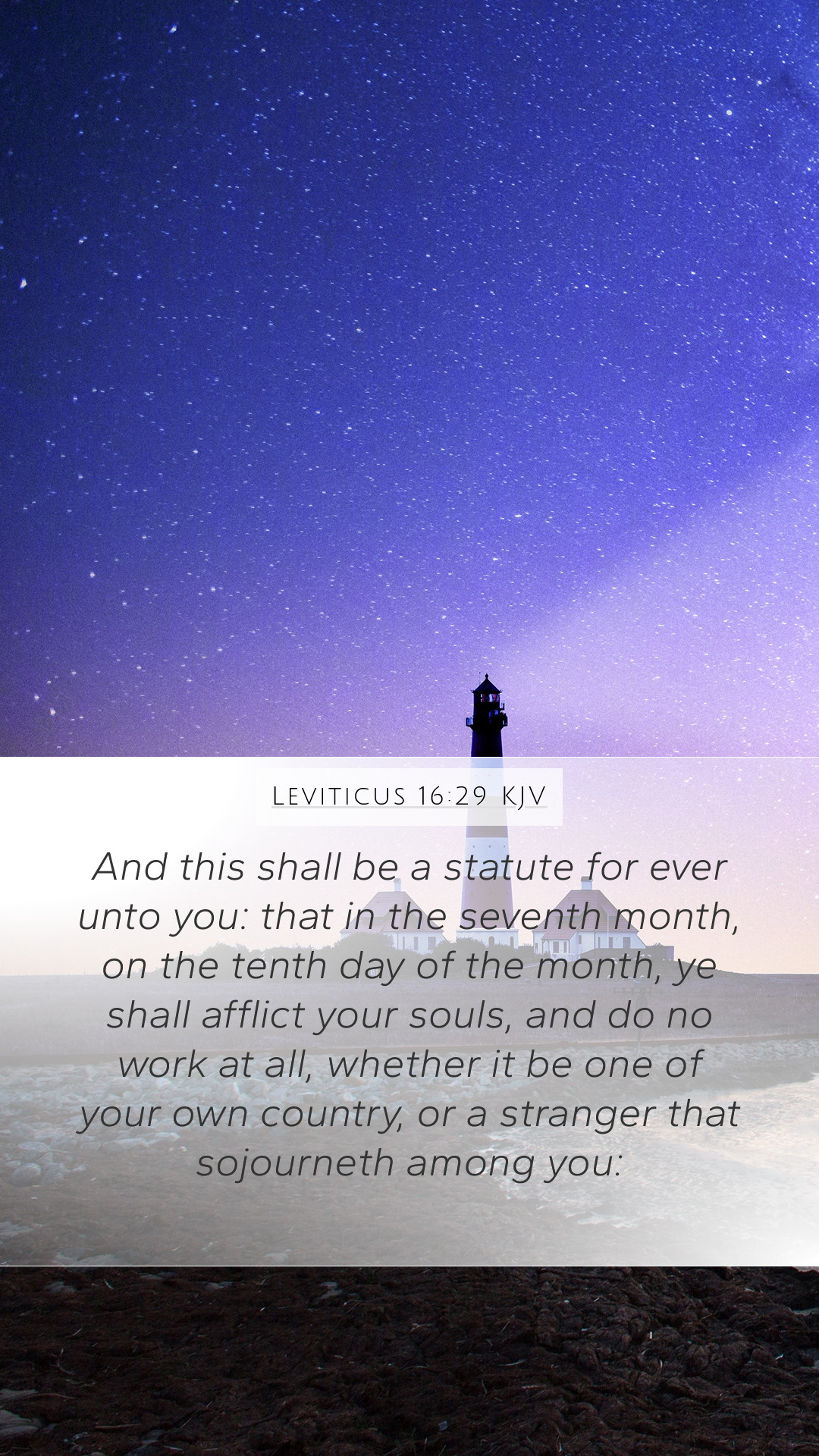Understanding Leviticus 16:29
Leviticus 16:29 states:
“And this shall be a statute forever unto you: That in the seventh month, on the tenth day of the month, ye shall afflict your souls, and do no work at all, whether it be one of your own country, or a stranger that sojourneth among you.”
In this vital passage, God outlines the significance of the Day of Atonement, a critical observance for the Israelites. Let’s delve into a comprehensive interpretation of this verse, drawing insights from respected public domain commentaries.
Significance of the Day of Atonement
The Day of Atonement, or Yom Kippur, serves as a fundamental day of repentance and atonement for the people of Israel. Matthew Henry notes that this day emphasizes the necessity of humbling oneself before God and recognizing human sinfulness. It illustrates the need for spiritual cleansing and the importance of acknowledging one's state before God.
-
Affliction of Souls:
Henry suggests that “afflicting one's soul” requires sincere humility, reflection, and a departure from sinful behaviors. It is not merely a ritualistic act but a heartfelt endeavor to seek reconciliation with God.
-
Inclusiveness:
The verse's instruction regarding “strangers” illustrates God’s desire for inclusivity in the call to repentance. Albert Barnes emphasizes that even foreign residents must participate in this solemn observance, reflecting the universal need for atonement.
-
God’s Eternal Statute:
The mention of this command as a "statute forever" underscores the ongoing importance of these practices in Israel’s covenant life. Adam Clarke explains that the enduring nature of this statute serves as a reminder that God's moral law transcends cultural and temporal boundaries.
Biblical Context and Historical Background
Understanding Leviticus 16:29 requires contextual insight. This command was situated within the Levitical laws given to Moses for the purification and sanctification of the Israelite community. The Day of Atonement is characteristically marked by the scapegoat ritual, where the sins of the people were symbolically laid upon a goat and sent into the wilderness.
-
Symbolism in the Scapegoat:
The scapegoat represented the removal of sin from the community, a theme echoed throughout Scripture. The emphasis on the seventh month and tenth day reflects God's order and timing in redemption.
-
Preparation for Judgment:
This day served as a preparation for God’s judgment, linking it to the necessity for atonement. The practice highlighted the Israelite community’s dependence on God’s mercy and grace.
Application for Today’s Believers
The directives of Leviticus 16:29 are less about ceremonial law and more about understanding our need for humility and repentance before God. Believers today can take lessons in the practices of self-examination and the acknowledgment of sin.
-
Self-Reflection:
Just as the Israelites were called to afflict their souls, so are modern believers encouraged to engage in self-reflection and be aware of their own shortcomings.
-
Community and Inclusivity:
This verse’s inclusivity message serves as a reminder that the call to repentance and atonement extends beyond cultural and societal boundaries. The church today mirrors this as a body that includes all, calling everyone to seek reconciliation with God.
-
Enduring Nature of God’s Law:
The permanence of this statute demonstrates God’s unchanging nature and His commitment to atonement, urging believers to remain steadfast in their faith practices.
Cross-References
- Leviticus 23:27 - The importance of the Day of Atonement.
- Hebrews 9:7 - The role of the high priest on the Day of Atonement.
- Romans 3:25 - Christ as the ultimate atonement for sin.
Conclusion
Leviticus 16:29 encapsulates vital themes on atonement, humility, and community within the framework of biblical law. Through careful study and understanding, we discover depth in this passage that has significant implications for both historical context and contemporary faith practices. As we reflect on the meaning of Bible verses such as this, we access essential insights for our Bible study groups and personal spiritual growth, guiding our understanding of Scripture and enhancing our application of its truths to daily life.


